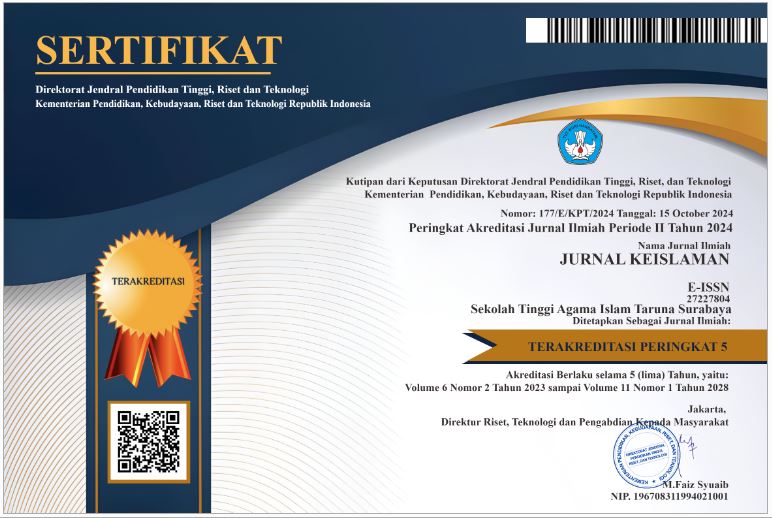Perspektif Pendidikan Islam Terhadap Poligami
DOI:
https://doi.org/10.54298/jk.v7i1.234Keywords:
Polygami, Education, IslamAbstract
This article discusses the issue of polygamy from the perspective of Islamic education which includes the legal basis governing the practice of polygamy and the application of Islamic educational values in the practice of polygamy. This research uses a type of library research, which is research related to reading, recording and managing materials used in activities related to research. The data collection technique uses library research. The research results show that basically polygamy can be carried out by applying the conditions regulated in the Al-Qur'an and positive law in Indonesia. In addition, by understanding and applying Islamic educational values such as justice and responsibility, polygamous marriages can be carried out with full wisdom, justice and harmony in accordance with Islamic teachings. The values in Islamic education create a strong foundation for building a balanced and sustainable family.
Downloads
References
Abdurrahman, Arif. 2003. Memahami Keadilan Dalam Poligami. Jakarta: PT Global Media Cipta Publishing.
Ghazali, Abdurrahmah. 2003. Fiqih Munakahat. Jakarta: Prenada Media.
Hamid, Al-Qamar. 2005. Hukum Islam Alternative Terhadap Masalah Fiqh Kontemporer. Jakarta: Restu Ilahi.
Hidayat Noor, Muhammad dkk. 2019. Menimbang Keadilan Poligami Dengan Model Matematika, Jurnal Hukum dan Ekonomi Islam, 18,(1), hal 139.
Kurnia, Eka. 2006. Poligami Siapa Takut. Jakarta: Qultum Media.
Musdah Mulia, Siti. 2007. Islam Menggugat Poligami. Jakarta: PT Gramedia Pustaka Utama.
Nuruddin, Amiur dan Azhari Akmal Tarigan. 2006. Hukum Perdata Islam di Indonesia. Jakarta: Kencana.
Sabiq, Sayyid. 1983. Fiqhus Sunnah. Beirut: Darul Fikr.
Setianini, Eni. 2007. Hitam Putih Poligami (Menelaah Perkawinan Poligami Sebagai Sebuah Fenomena). Jakarta: Cisera Publishing.
Sobari Sahrani, Tihami. 2013. Fiqh Munakahat: Kajian Fiqih Lengkap. Jakarta: Rajawali Pers.
Downloads
Published
How to Cite
Issue
Section
License
Copyright (c) 2024 Zuman Malaka

This work is licensed under a Creative Commons Attribution-ShareAlike 4.0 International License.
Authors who publish with this journal agree to the following terms:
- Authors retain copyright and grant the journal right of first publication with the work simultaneously licensed under a Creative Commons Attribution-ShareAlike 4.0 that allows others to share the work with an acknowledgement of the work's authorship and initial publication in this journal.
- Authors are able to enter into separate, additional contractual arrangements for the non-exclusive distribution of the journal's published version of the work (e.g., post it to an institutional repository or publish it in a book), with an acknowledgement of its initial publication in this journal.
- Authors are permitted and encouraged to post their work online (e.g., in institutional repositories or on their website) prior to and during the submission process, as it can lead to productive exchanges, as well as earlier and greater citation of published work (See The Effect of Open Access).


















